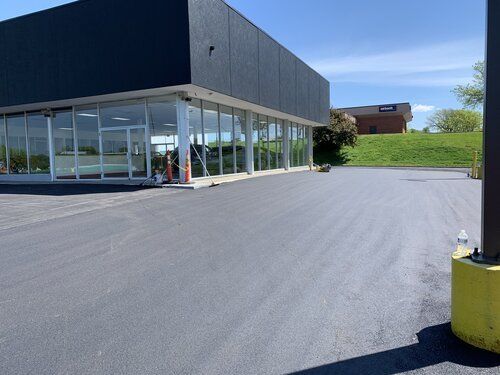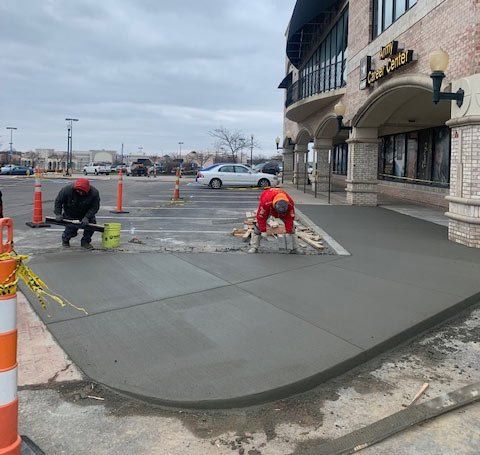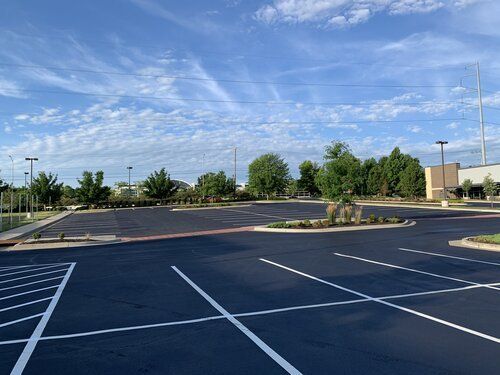Introduction
Asphalt surfaces, including driveways and parking lots, are prone to wear and tear over time due to traffic, weather conditions, and environmental factors. This is where sealcoating comes into play, especially after repairs. But when exactly is sealcoating necessary after performing asphalt repairs? In this comprehensive guide, we will explore the importance of sealcoating, how it protects your asphalt surfaces, the costs involved, and much more.

Sealcoating After Repairs: When Is It Necessary?
Sealcoating involves applying a protective layer over asphalt surfaces to extend their lifespan and maintain their appearance. After conducting repairs such as crack sealing or patching, it becomes essential to consider if sealcoating is necessary. The answer often depends on several factors:
Type of Repair Done: If you’ve repaired significant cracks or potholes using asphalt patching, the surface may require sealcoating to ensure uniformity and protection.
Time Since Last Sealcoat: If your driveway or parking lot hasn’t been sealcoated in a while (typically every 1-3 years), sealing it after repairs can provide added protection.
Traffic Levels: High-traffic areas usually benefit from sealcoating post-repair to minimize future damage.

Weather Conditions: If your area experiences harsh weather conditions like heavy rain or extreme heat, sealcoating after repairs helps shield against further deterioration.
Aesthetic Appeal: Sealcoating can significantly enhance the look of your pavement after repairs, giving it a fresh finish that’s visually appealing.
Long-term Maintenance Strategy: Incorporating sealcoating into your maintenance routine can prevent more severe problems down the line.
Understanding Sealcoating
What Is Sealcoating?
Sealcoating is a protective coating applied to asphalt surfaces designed to protect them from damage caused by UV rays, moisture, oil spills, and other harmful substances.
Benefits of Sealcoating
Protection Against Harsh Elements- Shielding against UV rays prevents oxidation. Moisture resistance reduces water damage.
- Regular sealcoating can save you money in the long run by delaying costly repairs.
- A fresh coat improves curb appeal for residential and commercial properties alike.
- Helps extend the life of your asphalt by protecting its integrity.
When Should You Consider Sealcoating?
While it’s generally recommended every 1-3 years depending on usage and condition, specific situations demand immediate attention:
- Newly installed asphalt should typically be sealed 6-12 months after installation. After significant repair work like crack sealing or patching. If there are visible signs of wear and tear such as fading or alligator cracking.
Types of Asphalt Repairs
Crack Sealing
Crack sealing involves filling in cracks with specialized materials to prevent moisture infiltration which can lead to more extensive damage.
Patching
Patching is used for repairing potholes or larger damaged sections of asphalt by removing the damaged material and replacing it with new asphalt mix.
Resurfacing
Resurfacing is an effective method for restoring an entire surface rather than individual spots; it involves applying a new layer on top of existing asphalt.
Is Sealcoating Necessary After Each Repair?
The necessity for sealcoating after every repair can vary based on:
The size and location of the repair. The age of the existing pavement. Traffic levels expected on that surface. Weather conditions in your area.Small vs Large Repairs
For minor repairs, such as small crack seals, you might not need immediate sealcoating unless it's part of an overall maintenance plan. However, larger patches likely require sealing soon afterward to blend seamlessly with surrounding areas and protect from future damage.
Asphalt Companies & Services
Choosing The Right Asphalt Company
When considering asphalt work—be it paving or maintenance—selecting a reputable company is crucial for quality results.
Factors To Consider:
- Experience in local climate conditions Range of services offered (including paving and sealcoating) Customer reviews and testimonials Cost estimates versus industry standards
Comparing Asphalt Paving Services
When looking at different contractors for paving services:
| Service Type | Estimated Cost | Considerations | |-----------------------------|------------------|-------------------------------------------| | Residential Paving | $3-$5/sq ft | Ideal for homes; consider driveway size | | Commercial Paving | $4-$8/sq ft | Designed for high traffic; durability needed | | Parking Lot Paving | $2-$6/sq ft | Depends on layout; compliance with ADA |
The Costs Associated With Sealcoating
Understanding the cost involved in sealcoating can help you plan your budget effectively:
Average Sealcoating Costs
Typically priced between $0.10 to $0.30 per square foot depending on various factors such as:
Size of area needing treatment Local labor rates Type of sealer being used Condition of existing pavementCost Breakdown Example:
| Item | Cost Estimate | |-------------------------|---------------------| | Labor | $0.08-$0.15/sq ft | | Materials | $0.02-$0.10/sq ft | | Cleanup & Preparation | Additional charges may apply |

DIY vs Professional Sealcoating
Pros & Cons Of DIY Sealcoating
While DIY might seem cost-effective initially, there are risks involved:
Pros:
- Lower upfront costs Flexibility in scheduling
Cons:
- Lack of professional-grade equipment Potential for uneven application leading to premature failure Time-consuming process
Hiring Professionals For Sealcoating
Investing in professional services ensures quality results:
Expertise in application techniques. Access to high-quality materials. Warranty on work performed.How Long Does It Take For Sealcoat To Dry?
Drying times vary based on several factors such as weather conditions—typically ranging from two hours up to 24 hours before allowing traffic back onto freshly sealed surfaces under ideal conditions (70°F+).
Frequently Asked Questions (FAQs)
1) How often should I apply sealcoat?
Typically every 1–3 years depending on usage, weather conditions, and current pavement condition.
2) Can I drive on my driveway immediately after sealing?
It’s best to wait at least 24 hours before driving on newly sealed surfaces for optimal curing time.
3) What type of sealer is best?
Coal tar emulsion offers excellent protection but varies by project needs; consult professionals for recommendations specific to your situation.
4) Will seal coating fix my cracks?
No! While it enhances protection against future damage, pre-existing issues like cracks should be addressed separately before applying a sealer layer.
5) How do I choose between resurfacing vs repaving?
Consider resurfacing if existing pavement remains structurally sound; repaving becomes necessary when there’s extensive underlying damage evident through deep cracks or significant deterioration patterns.
6) Is DIY sealing worth it?
Unless experienced with proper techniques & equipment used during commercial jobs—hiring professionals often yields better long-term results ensuring durability against harsh elements!
Conclusion
In conclusion, understanding when it's necessary to apply seal coating after repairs plays a critical role in maintaining your asphalt surfaces effectively while prolonging their lifespan significantly! Proper maintenance strategies including timely asphalt driveway Platinum Paving interventions like seal coating serve both functional purposes—protective measures—and aesthetic benefits enhancing property value overall! Thus choosing wisely between DIY solutions versus professional expertise allows homeowners/business owners alike make informed decisions ensuring lasting investments remain safeguarded throughout varying climates year-round!